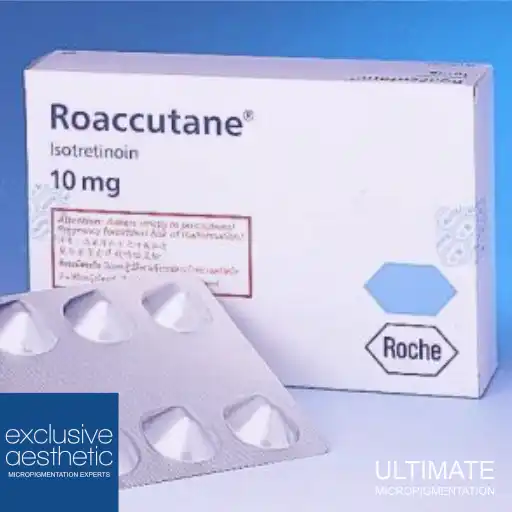Why Shouldn’t You Have a Semi Permanent Makeup Treatment On Roaccutane?
Why Shouldn’t You Have a Semi Permanent Makeup Treatment On Roaccutane?
Outline
Introduction
What are Roaccutane and semi-permanent makeup?
Importance of understanding interactions
Understanding Roaccutane
- Effects of Roaccutane on the skin
- Duration of Roaccutane treatment
- Risks associated with Roaccutane
- How Roaccutane Works
What is Semi-Permanent Makeup?
The Risks of Combining Roaccutane and Semi-Permanent Makeup
- Skin Sensitivity
- Increased Risk of Complications
- Poor Healing Process
- Advice from Dermatologists
Semi-Permanent Makeup and Roaccutane
- The impact of semi-permanent makeup during treatment
- Potential complications
- Interaction between makeup ingredients and medication
Precautions and Recommendations
- Professional advice before undergoing semi-permanent makeup
- Alternative makeup options
- Alternatives to Semi-Permanent Makeup During Roaccutane Treatment
Conclusion
FAQs
- Can I have Semi-Permanent Makeup before starting Roaccutane?
- How long should I wait after stopping Roaccutane before getting Semi-Permanent Makeup?
- Are there any topical treatments I can use instead of Roaccutane for acne?
- Can Semi-Permanent Makeup cause allergic reactions?
- Is it safe to undergo other cosmetic procedures while on Roaccutane?
- Can semi-permanent makeup be removed during treatment?
- How long should one wait after Roaccutane to get makeup?
- What if someone undergoes makeup during treatment?
- How does Roaccutane affect tattooing?
- Can I use temporary makeup while on Roaccutane?
- Is semi-permanent makeup safe after finishing treatment?

Why Shouldn’t You Have a Semi Permanent Makeup Treatment On Roaccutane?
Introduction
The use of Roaccutane and Semi-Permanent Makeup has become increasingly common. However, combining the two can lead to adverse effects on the skin. In this article, we’ll explore why having Semi-Permanent Makeup is not advisable while undergoing Roaccutane treatment.
What are Roaccutane and semi-permanent makeup?
Roaccutane, or isotretinoin, is a potent medication primarily used for treating severe acne. Semi-permanent makeup involves tattooing techniques to enhance features such as eyebrows, lips, and eyeliner, providing a long-lasting cosmetic effect.
Importance of understanding interactions
Understanding potential interactions between medications like Roaccutane and cosmetic procedures like semi-permanent makeup is crucial for ensuring safety and optimal results.
Understanding Roaccutane
Effects of Roaccutane on the skin
Roaccutane works by reducing the production of oil in the skin, effectively minimising acne breakouts. However, it also induces significant changes in skin texture and sensitivity.
Duration of Roaccutane treatment
Typically, Roaccutane treatment spans several months, during which the medication’s effects persist even after discontinuation.
Risks associated with Roaccutane
Roaccutane use carries various risks, including dryness, sensitivity, and increased sun sensitivity. These factors can impact the outcome of semi-permanent makeup procedures.
How Roaccutane Works
Roaccutane, or isotretinoin, is a powerful medication used to treat severe acne. It works by reducing the oil production by the skin’s oil glands, thereby preventing pores from becoming clogged and reducing the formation of acne lesions.
What is Semi-Permanent Makeup?
Semi-Permanent Makeup involves tattooing techniques to apply pigment to the skin, resembling everyday makeup. It’s a popular choice for individuals who want to enhance their eyebrows, lips, or eyelids without the daily hassle of applying makeup.
The Risks of Combining Roaccutane and Semi-Permanent Makeup
Skin Sensitivity
Increasing skin sensitivity is one of the primary concerns when combining Roaccutane and Semi-Permanent Makeup. Roaccutane can make the skin more fragile and prone to irritation, exacerbating the discomfort associated with tattooing.
Increased Risk of Complications
Combining Roaccutane and Semi-Permanent Makeup can increase the risk of complications during and after the procedure. Since Roaccutane affects the skin’s healing process, it may lead to prolonged recovery and a higher chance of infection or scarring.
Poor Healing Process
Roaccutane slows the skin’s natural healing process, making it more difficult for the body to repair after Semi-Permanent Makeup application. This can result in poor pigment retention and unsatisfactory cosmetic outcomes.
Advice from Dermatologists
Dermatologists strongly advise against undergoing Semi-Permanent Makeup while taking Roaccutane. They emphasise the importance of prioritising skin health and minimising potential risks, especially during treatment with such a potent medication.
Semi-Permanent Makeup and Roaccutane
The impact of semi-permanent makeup during treatment
Having semi-permanent makeup while on Roaccutane can pose challenges due to the skin’s altered condition. The procedure may not yield the desired results and could exacerbate skin sensitivity.
Potential complications
Complications such as poor pigment retention, uneven colour distribution, and prolonged healing times are common when combining semi-permanent makeup with Roaccutane treatment.
Interaction between makeup ingredients and medication
Certain ingredients commonly found in semi-permanent makeup, such as exfoliants or harsh chemicals, can worsen the side effects of Roaccutane and interfere with the healing process.
Precautions and Recommendations
Professional advice before undergoing semi-permanent makeup
Consulting with a dermatologist or skincare specialist is crucial before considering semi-permanent makeup, especially while undergoing Roaccutane treatment.
Alternative makeup options
To minimise adverse effects during Roaccutane treatment, opting for temporary makeup or traditional cosmetics that are gentler on the skin is advisable.
Alternatives to Semi-Permanent Makeup During Roaccutane Treatment
Instead of opting for Semi-Permanent Makeup during Roaccutane treatment, individuals can explore alternative options to enhance their appearance. These may include temporary makeup solutions, such as eyebrow pencils or lip stains, which can be easily removed and are less likely to cause complications.
Conclusion – Why Shouldn’t You Have a Semi Permanent Makeup Treatment On Roaccutane?
Informed decision-making regarding semi-permanent makeup while on Roaccutane is paramount to ensure safety and satisfactory results. Consulting with healthcare professionals and understanding the potential risks and interactions is essential for individuals considering cosmetic procedures during Roaccutane treatment.
It’s best to avoid Semi-Permanent Makeup while undergoing Roaccutane treatment. Combining these two treatments can lead to increased skin sensitivity, higher risks of complications, and poor healing outcomes. Prioritising skin health and exploring alternative cosmetic solutions are essential during this time.
FAQs
Can I have Semi-Permanent Makeup before starting Roaccutane?
It’s generally not recommended to undergo Semi-Permanent Makeup before starting Roaccutane, as it may still increase the risk of complications during treatment.
How long should I wait after stopping Roaccutane before getting Semi-Permanent Makeup?
Dermatologists typically advise waiting at least six months after completing Roaccutane treatment before considering Semi-Permanent Makeup.
Are there any topical treatments I can use instead of Roaccutane for acne?
Several topical treatments are available for acne, including benzoyl peroxide, salicylic acid, and topical retinoids.
Can Semi-Permanent Makeup cause allergic reactions?
Yes, Semi-Permanent Makeup can cause allergic reactions, especially in individuals with sensitive skin or allergies to certain pigments.
Is it safe to undergo other cosmetic procedures while on Roaccutane?
It’s essential to consult with a dermatologist before undergoing any cosmetic procedures while on Roaccutane, as the medication may increase the risk of complications and affect the healing process.
Can semi-permanent makeup be removed during treatment?
Removing semi-permanent makeup is possible, although healing times may be prolonged due to Roaccutane’s effects on skin regeneration.
How long should one wait after Roaccutane to get makeup?
It’s recommended to wait at least six months after completing Roaccutane treatment before undergoing semi-permanent makeup procedures.
What if someone undergoes makeup during treatment?
Undergoing semi-permanent makeup while on Roaccutane increases the risk of adverse effects, including poor healing and unsatisfactory results.
How does Roaccutane affect tattooing?
Roaccutane can affect tattooing outcomes by altering skin texture and pigment absorption, leading to inconsistent results and prolonged healing times.
Can I use temporary makeup while on Roaccutane?
Yes, temporary makeup options such as mineral-based cosmetics are safer during Roaccutane treatment due to minimal interference with the skin’s healing process.
Is semi-permanent makeup safe after finishing treatment?
To avoid potential complications, it is essential to wait until the skin has fully recovered and normalised after completing Roaccutane treatment before considering semi-permanent makeup.
Micropigmentation training by the industry expert with 35+ years’ experience.
Why Shouldn’t You Have a Semi Permanent Makeup Treatment On Roaccutane?
Links To Our UK Services
- Homepage
- SPMU Training
- Foundation SPMU Training
- Tattoo Removals Training
- Eyebrow Tattoo Training
- Lip Blush Training
- Medical Micropigmentation Training
- Scalp Micropigmentation Training
- Areola Tattoo Training
- Scar Removal Training
- Skin Rejuvenation Training
- All Training Courses
Why Shouldn’t You Have a Semi Permanent Makeup Treatment On Roaccutane?
GET IN TOUCH
If you would like to enquire about one of our training courses or treatments, message us using the floating widget (bottom right of the page), and we will contact you to discuss the next step.
Prefer to discuss using WhatsApp? Please get in touch with Candice using the number below.
Why Shouldn’t You Have a Semi Permanent Makeup Treatment On Roaccutane?
We support the NHS.

